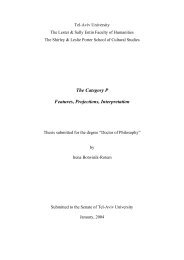Personalized Medicine “It doesn't get more personal than this.â€
Personalized Medicine “It doesn't get more personal than this.â€
Personalized Medicine “It doesn't get more personal than this.â€
You also want an ePaper? Increase the reach of your titles
YUMPU automatically turns print PDFs into web optimized ePapers that Google loves.
evival<br />
By Louise Shalev<br />
14<br />
You need a good grounding in music,<br />
history and philosophy to grasp the<br />
shift from classical to Romantic music<br />
and a strong knowledge of philosophy<br />
and literature to conduct a Nietzschian<br />
reading of Shay Agnon.It’s <strong>this</strong> type of<br />
broad, interdisciplinary exploration that<br />
is the hallmark of TAU’s Marc Rich<br />
Honors Program in the Humanities<br />
and Arts, a unique program providing<br />
a concentration in both fields of study<br />
at the undergraduate level.<br />
The program is a joint initiative of<br />
Prof. Shlomo Biderman, former Dean<br />
of the Entin Faculty of Humanities,<br />
and Prof. Hannah Naveh, Dean of the<br />
Katz Faculty of Arts. Now entering its<br />
Cultural Immersion<br />
fifth year of operation, the program<br />
was designed to redress the declining<br />
status of the arts and humanities in<br />
society in recent years and reestablish<br />
these concentrations as crucial fields of<br />
relevance to students. The program is in<br />
line with – and even preceded – recent<br />
recommendations by a special committee<br />
of academic representatives and<br />
business people to increase the number<br />
of excellence programs in the arts and<br />
humanities at Israeli institutions of<br />
higher education.<br />
“This is a degree program with a<br />
mission,” states program head Dr. Iris<br />
Milner, a Hebrew literature expert.<br />
“We take about 20 highly intelligent<br />
and motivated students each year and<br />
expose them to the widest possible scope<br />
of disciplines in arts and humanities,<br />
while also nurturing them towards advanced<br />
research,” says Milner. “Our aim<br />
is to develop a cadre of researchers and<br />
thinkers in the liberal arts.”<br />
The Marc Rich Honors Program in the Humanities and the Arts<br />
is helping rejuvenate undervalued study areas<br />
Value system<br />
The program’s initiators also see<br />
it as a way of contributing to tikkun<br />
olam in Israel. “By reinstating the value<br />
placed upon humanities and arts we<br />
are ultimately bringing about positive<br />
and profound change in the Israeli<br />
value system,” says Dean of Arts Prof.<br />
Hannah Naveh.<br />
These lofty ideals are in line with the<br />
aspirations of program graduate Reuel<br />
Shualy, 30. Reuel took the program out<br />
of a desire to make a real change in<br />
Israeli society, particularly in the field<br />
of education. Reuel, a combat helicopter<br />
pilot who fought in the Second Lebanon<br />
War, believes that a broad knowledge<br />
of culture is essential to understanding<br />
humankind. He hopes <strong>this</strong> understanding<br />
will guide him toward a meaningful<br />
leadership position in society, perhaps<br />
as a school principal.<br />
Reuel grew up in the southern Negev<br />
town of Mitzpe Ramon, one of ten sib-<br />
lings in a secular family. His parents,<br />
ex-kibbutzniks, moved there out of ideological<br />
reasons to settle the Negev. He<br />
attended high school in Sde Boker at<br />
a school specializing in environmental<br />
and field studies, but also developed a<br />
love of reading and writing poetry at<br />
an early age.<br />
Like other students in the program,<br />
Reuel took two study clusters from each<br />
faculty, for a total of four: cinema, theater,<br />
philosophy and literature. “All four<br />
are separate languages that speak to one<br />
another,” he says. “Knowing Nietzsche<br />
helps me understand the concept of<br />
tragedy in the theater, for example. In<br />
the end, all art speaks about life. Cinema<br />
does it through the screen; theater, on<br />
stage; and philosophy speaks about humans<br />
through literature and writing.”<br />
High or low art?<br />
“I don’t believe in high art or low<br />
art,” says Reuel. “There is complex art.

















